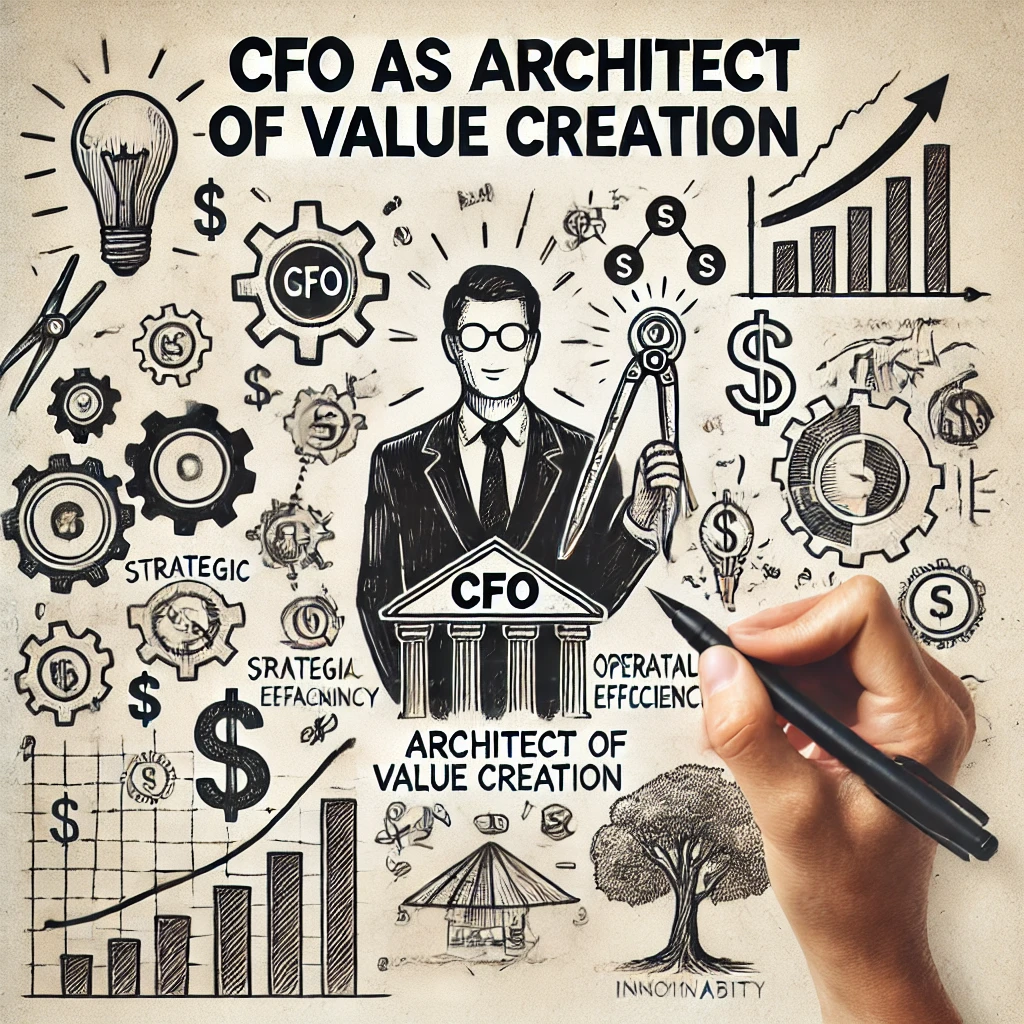As financial leaders, CFOs are increasingly called upon to expand their role beyond traditional financial oversight and contribute to broader societal and environmental goals. Last week, we highlighted the importance of inner work in making this transformation sustainable. Now, let’s explore the leadership and professional best practices that guide CFOs in becoming Chief Value Officers (CVOs).
For CFOs to transform into CVOs, they must redefine their role from primarily financial stewardship to being architects of value creation in a holistic sense, balancing financial, social, and environmental considerations.
This transformation involves:
– Expanded accountability: A CVO is responsible not just for financial outcomes but also for the company’s contributions to societal well-being and environmental stewardship.
– External partnerships and collaborations: Building collaborations with governments, NGOs, and industry partners is critical to achieving long-term goals.
– Driving innovation: The CVO is at the forefront of driving innovation, ensuring that sustainability is integrated into all aspects of business operations and decision-making.

Here are the seven professional learnings I gathered from this reflection, which I believe are crucial for CFOs and business leaders transitioning towards broader societal and environmental value creation.
Learning # 1. Understanding and Aligning with SDGs
CFOs must begin their journey by deeply understanding the Sustainable Development Goals (SDGs) and aligning them with their company’s mission:
– Educate and align leadership: CFOs should gain a deep understanding of SDGs and work closely with the board and executive teams to embed SDG targets into the corporate strategy.
– Identify relevant SDGs: Not every SDG will be equally relevant to every business. CFOs should lead an assessment to determine which goals align best with the company’s values, operations, and long-term vision.
Learning # 2. Shift from Shareholder Value to Stakeholder Value
A critical step in this transformation is expanding the financial framework to integrate broader value considerations:
– Expanded financial metrics: A CVO includes environmental and social metrics, , including the company’s contributions to the SDGs thus measuring a company’s true impact beyond profit margins and shareholder returns.
– Adopt Integrated reporting: Combining financial, social, and environmental reporting provides stakeholders with a holistic view of value creation across all stakeholder groups.
Learning # 3. Embedding Sustainability into Corporate Strategy
To make a lasting impact, sustainability must be embedded into corporate governance:
– Long-term value creation: CFOs should shift the corporate focus from short-term gains to sustainable, long-term value creation that balances profitability with societal impact.
– Investment in sustainability: Lead investments in projects that align with SDGs, such as green technologies, sustainable supply chains, or inclusive business models.
Learning # 4. Developing Sustainable Finance Models
Creating financial models that incentivize sustainability is at the core of the CVO role:
– Sustainable investment strategies: CFOs should explore instruments like green bonds and sustainability-linked loans or impact investment funds to attract investment and drive impact.
– Carbon accounting and internal pricing: Tools like carbon pricing ensure that environmental costs are factored into decision-making, encouraging responsible investment decisions.
Learning # 5. Leveraging Data & Technology
Data is key to tracking and reporting on sustainability efforts:
– Sustainability KPIs: Estalish key performance indicators (KPIs) for sustainability goals and track progress using advanced data analytics and technologies like AI or blockchain for transparency and to provide insights for decision-making.
– Real-time monitoring and reporting: Use technologies like AI and blockchain y to monitor SDG-related initiatives and report on the progress of sustainability in real-time, providing clear, actionable insights for decision-making.
Learning # 6. Transforming Corporate Governance
Good governance structures must evolve to support sustainability:
– Create an inclusive governance structure: The CFO as a CVO should ensure that accountability for SDG targets is built into the company’s governance framework. This includes forming sustainability committees or assigning accountability for SDG-related targets at the board level.
– Engage with stakeholders: Actively involve stakeholders including customers, investors, employees, and communities, to ensure alignment and collaboration on SDG goals.
Learning # 7. Fostering a Culture of Sustainability
CFOs should inspire a culture of sustainability across their organizations:
– Internal leadership on sustainability: CFOs should lead by example and champion sustainable practices within the company, ensuring that every employee understands the importance of their role in achieving SDG goals.
– Training and development: Implement programs to upskill employees on sustainability issues, enabling them to contribute more effectively to the company’s goals.
Learning # 8. Evolving Risk Management
In the transformation from CFO to CVO, risk management must expand beyond traditional financial, operational and market risks to include environmental, social, and governance (ESG) risks such as climate change, resource scarcity, and social unrest, which can have profound impacts on business sustainability.
– Scenario analysis for long-term risks: Implement scenario analysis and stress testing to assess the long-term risks posed by climate change, regulatory shifts, and societal expectations. This ensures that the company is prepared for emerging risks that could affect future value creation.
– Integrating ESG into enterprise risk management (ERM): Incorporate ESG factors into the company’s ERM framework, ensuring that sustainability risks are managed with the same rigor as financial risks. This involves aligning risk assessment processes with SDG goals and taking a holistic approach to risk mitigation.
– Stakeholder risk: Engage stakeholders to understand their concerns about environmental and social issues, as they may present reputational risks if not managed proactively.

Embracing the Journey
For CFOs, this journey involves both professional and personal transformation. It requires continuous self-reflection, learning, and a shift in perspective:
– Expanded leadership skills: From financial expertise to empathy, emotional intelligence, and a commitment to sustainability.
– Resilience and adaptability: Navigating the complexities of a changing world while driving systemic change within the company.
The Benefits of Transforming into a CVO
The transformation from CFO to CVO offers profound benefits for both the individual leader and the company as a whole. By embracing a broader vision of value creation, CFOs can ensure long-term relevance in a rapidly changing world, while enhancing the company’s brand reputation as a responsible leader in sustainability. This shift fosters customer loyalty as consumers increasingly seek out businesses that align with their values. Additionally, adaptability and flexibility become integral strengths, allowing companies to better navigate market disruptions and emerging challenges.
Companies led by CVOs are also better positioned to attract and retain talent, as employees are drawn to organizations with a clear purpose and commitment to societal impact. This environment nurtures creativity and innovation, enabling teams to develop solutions that address both business and global challenges. Employee engagement rises as individuals feel a stronger connection to the company’s mission, while attracting investment becomes easier as sustainability-minded investors seek out opportunities with clear environmental, social, and governance (ESG) criteria. Finally, companies gain a positive influence on the community and ensure compliance with regulations, reducing risks while enhancing overall societal contributions.
Everything to Play For
As CFOs, you are uniquely positioned to drive this transformation. By expanding your focus beyond financial stewardship to include societal and environmental value, you can unlock new opportunities for growth, resilience, and innovation. The journey toward becoming a Chief Value Officer is not only necessary for future success, but it is also a chance to lead with purpose, integrity, and long-term impact.
With the stakes high and the rewards greater than ever, CFOs have everything to play for. Are you ready to begin your journey toward becoming a CVO?
If you would like to watch the recording of the webinar, click here for the link. Passcode: 5v%&w+rd
Let’s keep the conversation going. Share your stories and ideas with us, and let’s inspire each other to make a difference!
We can offer you support with both the inner and the outer work through the HeartWork Inner Knowing Journey, the Purpose Driven Impact Journey and deep experience with complex business transformations.
Please let us know what you think, we would love to hear from you via sendlove at heartwork dot earth.
